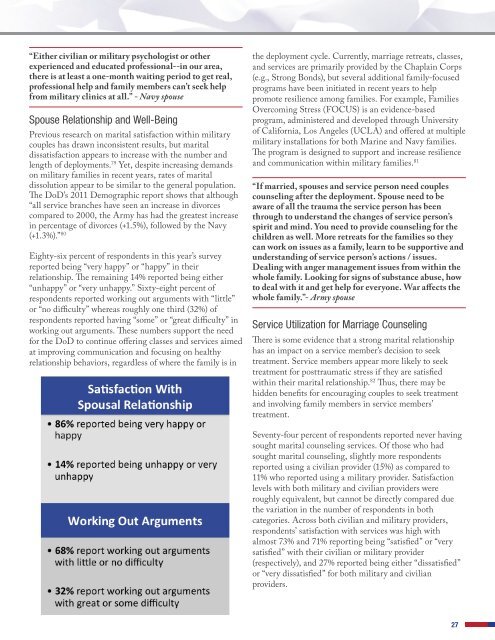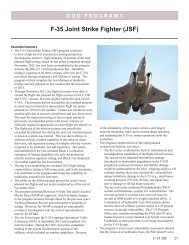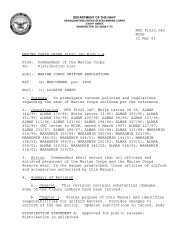Spouse Relationship and Well-Being Service Utilization for Marriage Counseling
pages-from-comprehensive_report2013.pdf
pages-from-comprehensive_report2013.pdf
You also want an ePaper? Increase the reach of your titles
YUMPU automatically turns print PDFs into web optimized ePapers that Google loves.
“Either civilian or military psychologist or other<br />
experienced <strong>and</strong> educated professional--in our area,<br />
there is at least a one-month waiting period to get real,<br />
professional help <strong>and</strong> family members can’t seek help<br />
from military clinics at all.” - Navy spouse<br />
<strong>Spouse</strong> <strong>Relationship</strong> <strong>and</strong> <strong>Well</strong>-<strong>Being</strong><br />
Previous research on marital satisfaction within military<br />
couples has drawn inconsistent results, but marital<br />
dissatisfaction appears to increase with the number <strong>and</strong><br />
length of deployments. 79 Yet, despite increasing dem<strong>and</strong>s<br />
on military families in recent years, rates of marital<br />
dissolution appear to be similar to the general population.<br />
The DoD’s 2011 Demographic report shows that although<br />
“all service branches have seen an increase in divorces<br />
compared to 2000, the Army has had the greatest increase<br />
in percentage of divorces (+1.5%), followed by the Navy<br />
(+1.3%).” 80<br />
Eighty-six percent of respondents in this year’s survey<br />
reported being “very happy” or “happy” in their<br />
relationship. The remaining 14% reported being either<br />
“unhappy” or “very unhappy.” Sixty-eight percent of<br />
respondents reported working out arguments with “little”<br />
or “no difficulty” whereas roughly one third (32%) of<br />
respondents reported having “some” or “great difficulty” in<br />
working out arguments. These numbers support the need<br />
<strong>for</strong> the DoD to continue offering classes <strong>and</strong> services aimed<br />
at improving communication <strong>and</strong> focusing on healthy<br />
relationship behaviors, regardless of where the family is in<br />
the deployment cycle. Currently, marriage retreats, classes,<br />
<strong>and</strong> services are primarily provided by the Chaplain Corps<br />
(e.g., Strong Bonds), but several additional family-focused<br />
programs have been initiated in recent years to help<br />
promote resilience among families. For example, Families<br />
Overcoming Stress (FOCUS) is an evidence-based<br />
program, administered <strong>and</strong> developed through University<br />
of Cali<strong>for</strong>nia, Los Angeles (UCLA) <strong>and</strong> offered at multiple<br />
military installations <strong>for</strong> both Marine <strong>and</strong> Navy families.<br />
The program is designed to support <strong>and</strong> increase resilience<br />
<strong>and</strong> communication within military families. 81<br />
“If married, spouses <strong>and</strong> service person need couples<br />
counseling after the deployment. <strong>Spouse</strong> need to be<br />
aware of all the trauma the service person has been<br />
through to underst<strong>and</strong> the changes of service person’s<br />
spirit <strong>and</strong> mind. You need to provide counseling <strong>for</strong> the<br />
children as well. More retreats <strong>for</strong> the families so they<br />
can work on issues as a family, learn to be supportive <strong>and</strong><br />
underst<strong>and</strong>ing of service person’s actions / issues.<br />
Dealing with anger management issues from within the<br />
whole family. Looking <strong>for</strong> signs of substance abuse, how<br />
to deal with it <strong>and</strong> get help <strong>for</strong> everyone. War affects the<br />
whole family.”- Army spouse<br />
<strong>Service</strong> <strong>Utilization</strong> <strong>for</strong> <strong>Marriage</strong> <strong>Counseling</strong><br />
There is some evidence that a strong marital relationship<br />
has an impact on a service member’s decision to seek<br />
treatment. <strong>Service</strong> members appear more likely to seek<br />
treatment <strong>for</strong> posttraumatic stress if they are satisfied<br />
within their marital relationship. 82 Thus, there may be<br />
hidden benefits <strong>for</strong> encouraging couples to seek treatment<br />
<strong>and</strong> involving family members in service members’<br />
treatment.<br />
Seventy-four percent of respondents reported never having<br />
sought marital counseling services. Of those who had<br />
sought marital counseling, slightly more respondents<br />
reported using a civilian provider (15%) as compared to<br />
11% who reported using a military provider. Satisfaction<br />
levels with both military <strong>and</strong> civilian providers were<br />
roughly equivalent, but cannot be directly compared due<br />
the variation in the number of respondents in both<br />
categories. Across both civilian <strong>and</strong> military providers,<br />
respondents’ satisfaction with services was high with<br />
almost 73% <strong>and</strong> 71% reporting being “satisfied” or “very<br />
satisfied” with their civilian or military provider<br />
(respectively), <strong>and</strong> 27% reported being either “dissatisfied”<br />
or “very dissatisfied” <strong>for</strong> both military <strong>and</strong> civilian<br />
providers.<br />
27
2013 MILITARY FAMILY LIFESTYLE SURVEY REPORT<br />
“There were plenty of resources, but if there was ever a<br />
chance it could get back to the company, I wouldn’t<br />
consider it. I think that most military families have the<br />
same mindset. Personal issues are made public through<br />
gossip <strong>and</strong> word of mouth. No one wants their family to<br />
be in that position.” - Army spouse<br />
“<strong>Counseling</strong> will not fix problems regarding the fact that<br />
my husb<strong>and</strong> is never home even when he is not deployed.”<br />
- Army spouse<br />
When respondents were asked about which military<br />
resources they used <strong>for</strong> marital counseling, Military<br />
OneSource was cited most often (24%), followed by<br />
service-specific Military Support Centers such as Fleet <strong>and</strong><br />
Family <strong>Service</strong>s or Army Community <strong>Service</strong>s (21%) <strong>and</strong><br />
chaplains (18%). Military hospitals <strong>and</strong> clinics were used by<br />
11% of respondents, military treatment facilities (MTF) by<br />
10%, <strong>and</strong> the Family Assistance Program (FAP) by 6%.<br />
When respondents were asked to cite reasons <strong>for</strong> not<br />
seeking services <strong>for</strong> marital counseling, the majority (75%)<br />
stated that they “did not feel it was necessary.” Among<br />
both spouses <strong>and</strong> service members, “spouse refusal/<br />
resistance” <strong>and</strong> “concerns about confidentiality” were the<br />
additional top reasons <strong>for</strong> not seeking marital counseling<br />
services <strong>and</strong> were each cited by 7% of respondents. These<br />
reasons are consistent with other research as top barriers to<br />
mental health treatment within the military population. 92<br />
Communication During Deployment<br />
The quality of communication during deployment has been<br />
associated with improved family functioning. 83 The<br />
frequency of communication has also been examined <strong>and</strong><br />
there is some indication that the frequency of<br />
communication may help improve the at-home spouse’s<br />
general well-being. 84 For example, a recent study conducted<br />
by the REACH program at the University of Arizona<br />
found that e-mail was the most frequently used <strong>for</strong>m of<br />
communication used by active duty spouses <strong>and</strong> had the<br />
strongest association with general well-being of the athome<br />
spouse. 85 The majority of spouses in this survey<br />
report being able to communicate frequently with their<br />
spouses during deployments, with 25% reporting that they<br />
communicated with their service members daily. Forty<br />
percent were in touch with their service members a couple<br />
of times a week, <strong>and</strong> 14% reported communication once a<br />
week. Two-percent reported communicating less than once<br />
per month.<br />
Military Family Separations <strong>for</strong><br />
Reasons Other Than Deployment<br />
In addition to deployments, military families experience<br />
routine separations throughout the lifecycle of military<br />
careers (e.g., training, workups, detachments,<br />
unaccompanied tours of duty). In fact, in this survey,<br />
deployments accounted <strong>for</strong> roughly half of the time<br />
families spent apart. The other half was related to training,<br />
workups, detachments, <strong>and</strong> other support-oriented<br />
activities.<br />
“As a military spouse getting a master’s degree in a<br />
specialized field one of my biggest concerns is the<br />
inability to stay in one location <strong>for</strong> more than three years.<br />
Even fields that are easily transferable, such as teachers,<br />
still have to start from the bottom up every move. I have<br />
seen so many spouses quit working due to sheer<br />
frustration with the job hunt every six months to three<br />
years. The reduced earning power is drastic. We have<br />
benefited from our military service, but we will not<br />
choose to pursue this lifestyle after his time is up.”<br />
- Navy spouse<br />
Additionally, while the majority of respondents indicated<br />
that they had not chosen to live separately, or “geo-bach,”<br />
some respondents had chosen to live apart from their<br />
spouses <strong>for</strong> a variety of reasons. The top reason given <strong>for</strong><br />
“geo-baching” was spouse employment, reported by 17% of<br />
respondents. Family support (11%), child (12%) or spouse<br />
education (10%), <strong>and</strong> the inability to sell a home (9%) were<br />
other top reasons <strong>for</strong> living separately. Respondents could<br />
offer an open-ended response to this question <strong>and</strong> provide<br />
their own reason <strong>for</strong> living separately. These responses fell<br />
into the following categories: (1) financial/cost of living (2)<br />
legal issues that include separation, impending divorce, or<br />
custody issues (3) medical care <strong>for</strong> a family member (4)<br />
short or unaccompanied duty tours (5) issues related to<br />
status as a domestic partner (e.g., partner could not move<br />
with service member due to unrecognized or non-marital<br />
status), <strong>and</strong> (6) issues with citizenship or visas.<br />
Reported <strong>Service</strong> Branch Support<br />
<strong>for</strong> Military Lifestyle Issues<br />
Respondents were asked to rate their service branch’s<br />
sensitivity to a variety of key family-related issues<br />
including: (1) maintaining contact during deployment (2)<br />
awareness of support services (3) preparing families <strong>for</strong><br />
deployment (4) spouse career <strong>and</strong> (5) cutting orders around<br />
school schedules. The single highest response to this<br />
question was related to comm<strong>and</strong> sensitivity to spouse<br />
employment issues. Fifty-four percent reported that their<br />
28






